
Cardiff research participants play vital role in showing safety of simultaneous COVID-19 and flu vaccines
1 October
Research undertaken in the Cardiff and Vale University Health Board Bayside Mass Vaccination Centre has found that it is safe for people to receive a flu vaccine at the same time as a COVID-19 vaccine.
Reported side effects were mainly mild to moderate, and there were no negative impacts on the immune response produced by either vaccine when both were given on the same day, in opposite arms.
The Combining Influenza and COVID-19 Vaccination (ComFluCOV) study, led by the Bristol Trials Centre, University of Bristol, University Hospitals Bristol and Weston NHS Foundation Trust, recruited from 12 NHS sites across England and Wales, including Cardiff Bayside Mass Vaccination Centre. A total of 679 volunteers took part in the study in the UK.
Earlier in the pandemic, it was not known whether further booster doses of COVID-19 vaccines would be required to give continued protection, and how giving boosters may fit in with the seasonal flu vaccine programme.
The study looked to establish the safety of co-administering the most widely used COVID-19 and influenza vaccines in the UK and describe the expected side effects and immune responses to the vaccines when they are given together. Two COVID-19 and three influenza vaccines were tested, meaning six combinations in all.
Participants recruited to the study were over the age of 18 and had already received one dose of either the Pfizer/BioNTech or the Oxford/AstraZeneca COVID-19 vaccine and were awaiting their second dose.
The most common side effects were pain around the injection site and fatigue. With some combinations there was an increase in the number of people who reported at least one side effect when both COVID-19 and flu vaccine were given together, but the reactions were mostly mild or moderate.
The immune responses to both the influenza and COVID-19 vaccine were preserved when given together, and 97% of participants said they would be willing to have two vaccines at the same appointment in the future.
Seralynne Vann, a neuroscientist from Cardiff, took part in the trial in May earlier this year:
“I heard about the trial from a friend who thought I may be interested, and the whole process of taking part was really straight forward and easy. I had two jabs in the first appointment, one which was a COVID-19 vaccine and another which was either a flu vaccine or a salt water placebo.
“During the pandemic, I think lots of people wanted to be able to help or contribute in some way. I’ve benefitted from a lot of medicines and public health initiatives in my life, and it’s important to me to be involved in trying to improve them. If you can participate, go for it!”
Dr Andrew Carson-Stevens, Principal Investigator for the ComFluCOV Study and Health and Care Research Wales Specialty Lead for Primary Care, said: “High rates of influenza, alongside further waves of COVID-19, are predicted for this winter. It is extremely important that COVID-19 and influenza vaccines are delivered in a timely manner. The ComFluCOV study gives us confidence to safely deliver COVID vaccine booster doses and the seasonal influenza vaccine together in an effort to protect the most vulnerable in society.”
Dr Nicola Williams, Director of Support and Delivery at Health and Care Research Wales said: “This research has provided important and reassuring results that will make vaccination this winter more efficient for both patients and the NHS. I am thankful to the Welsh participants and researchers who made this study possible, and those who continue to contribute to the fight against the COVID-19 pandemic.”
Professor Stuart Walker, Interim Chief Executive of Cardiff and Vale University Health Board, said: “I’m delighted that our research teams and staff at Bayside Mass Vaccination Centre played a key role in this study, once again making an important contribution to global research efforts to identify safe and effective treatments against COVID-19. These findings will enable us to efficiently vaccinate vulnerable communities against both flu and COVID-19, helping us to keep as many people safe as possible going into winter.”